Ella Harrison, Polish Folk Witch, and the Redheaded Witch kickstarted a conversation online called “Social Media Witchcraft: Grifters, Aesthetics, Imposter Syndrome, Consumerism & Gatekeeping” via the hashtag #OcculTea. It’s a long title, and the prompt has many questions. Most of the responses I’ve seen are in the form of long YouTube videos, but people can respond however they like, including blogging and social media posts. I’ve only ever made one YouTube video, and I don’t enjoy being in front of the camera, so here we are.
This blog entry is long, about 3,700 words and 15 minutes of reading time. For convenience, I’ve added a table of contents with links, which you close or expand.
Table of Contents
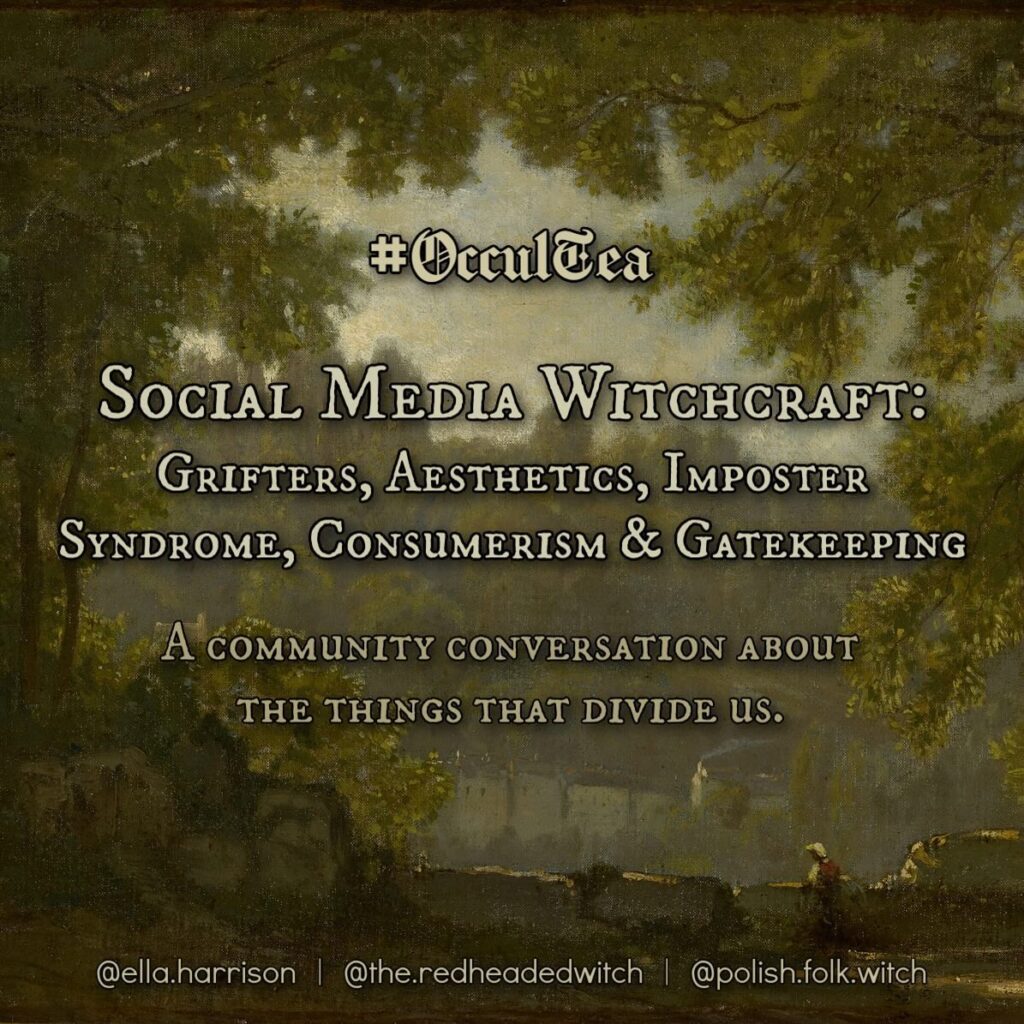
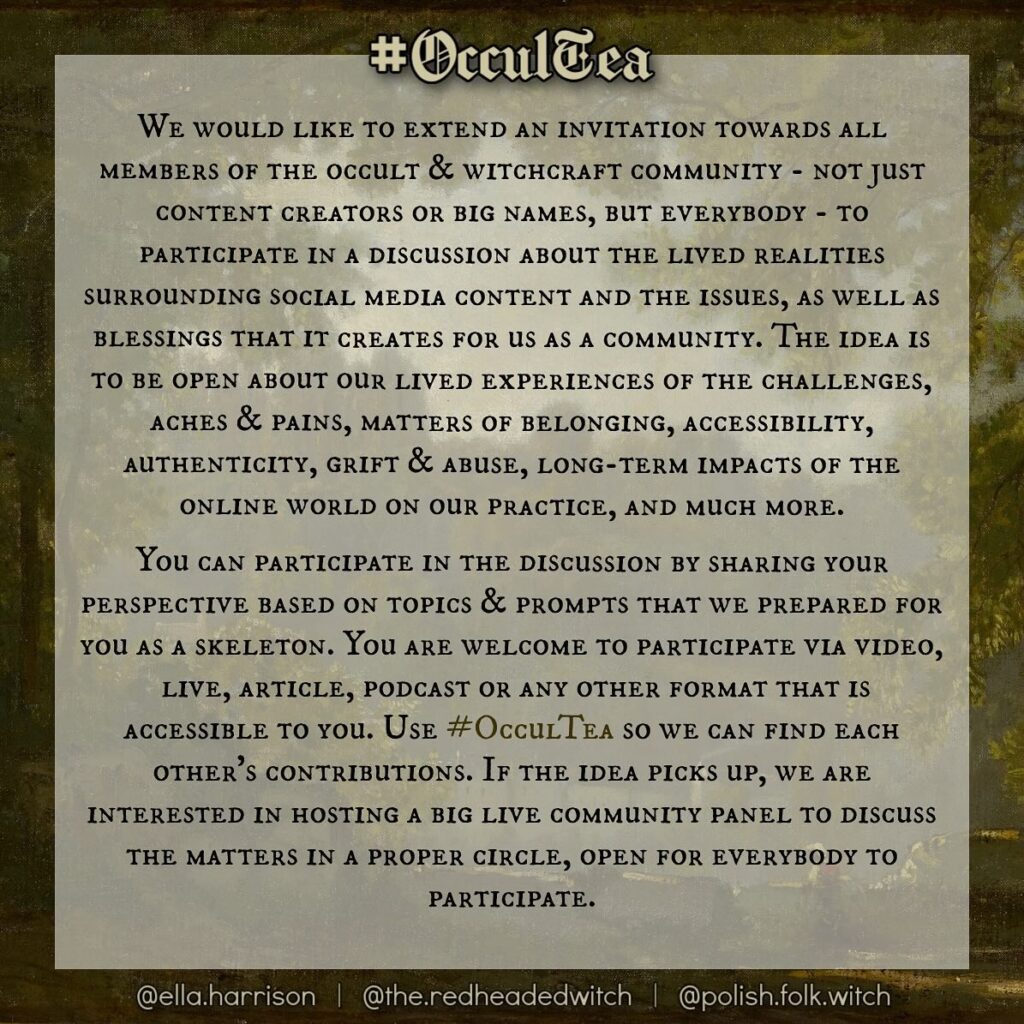
The false dichotomy of online and offline
Before diving in, some of these questions have been challenging to answer. They speak to “community” without defining that and present a dichotomy between online and offline.
My online community is an extension of my in-person community. The majority of people that I engage with regularly online are friends, acquaintances, and other connections from my in-person communities, even if those have become distant because I moved to another country. The internet has allowed us to remain in touch more easily and helped maintain and strengthen relationships. I don’t belong to any online community that doesn’t have an in-person element.
I understand that, for various reasons, some Witches don’t engage with others in person, but the impact of virtual conversations and activities extends into the offline part of our lives. “Online” and “offline” exist together, and neither can be fully understood without the other.
Introduction
Introduce yourself. How long have you been participating in the witchcraft online space? What practices and topics do you discuss primarily?
I’m Cosette. I was born in Havana, Cuba, raised in Miami, and reside in Melbourne, Australia. I’m a Gen Xer with a career that shifted from news reporting to digital communications. My spiritual journey began in the early 1990s, culminating in initiation into the Georgian Tradition of Wicca in 2007.
I’ve been exploring online witchcraft spaces since I gained access to the World Wide Web in the early 1990s. Today, I mainly share information about my studies and practice on my blog and social media. Topics include goddess devotion, divination, and theological enquiries.
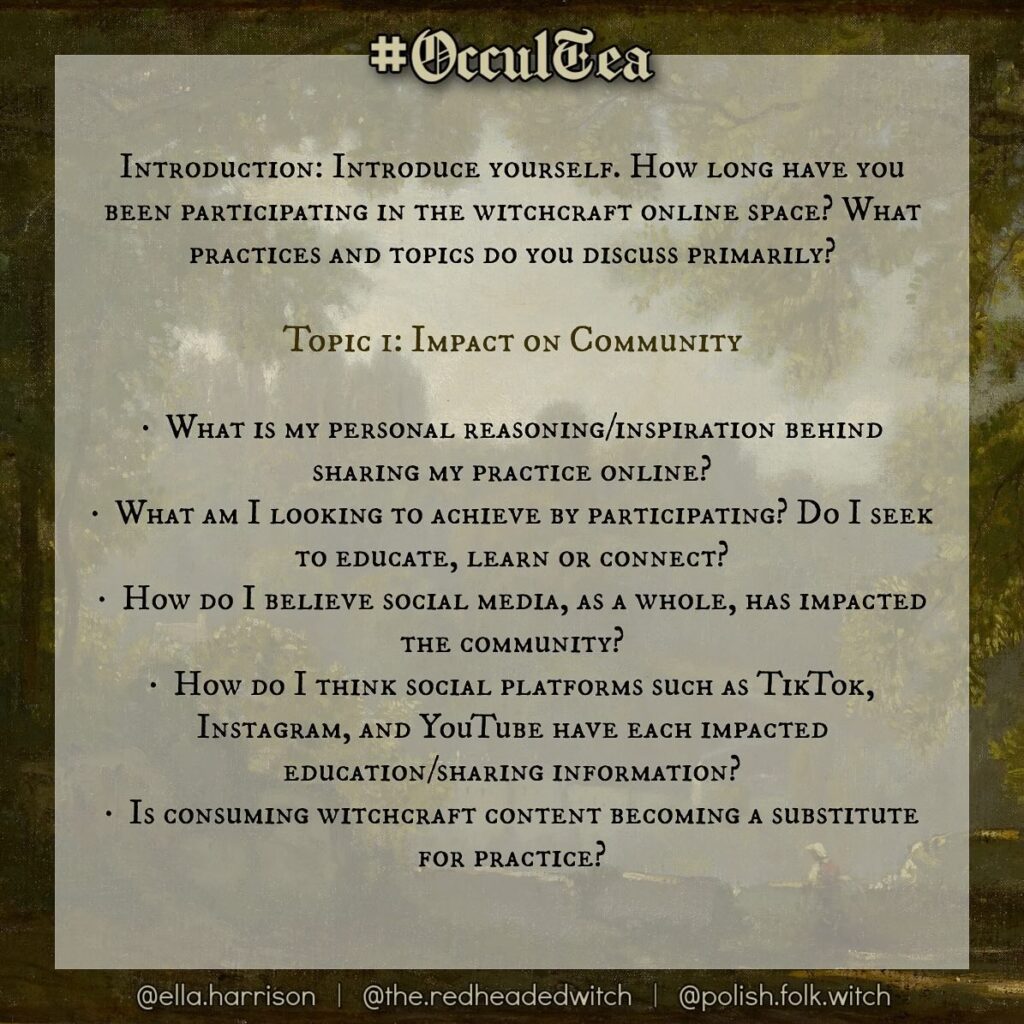
Topic 1: Impact on Community
What is my reasoning/inspiration behind sharing my practice online?
What am I looking to achieve by participating? Do I seek to educate, learn, or connect?
I started blogging a long time ago in the AOL Journals community. I began blogging because I have always enjoyed exploring new technologies and communities (even if I don’t always participate in them). Writing is an important way to process information and refine my ideas. I blog to document and share my insights and approaches to Paganism and Witchcraft.
I use social media platforms in different ways. I use my personal Facebook account to connect with family and friends and my Facebook Page to promote this website. I use Instagram to look at pretty pictures and promote this website. I use Twitter to share my political perspectives, yell at the void, and get support from companies that otherwise ignore customer service requests via phone calls and emails. I have a YouTube channel, but I’ve only made one video. Recently, I started using TikTok to share more about my approach to Paganism and Witchcraft, which is similar to what other Witches I know do but can be very different from aesthetic presentations of witchcraft on social media.
“Participation” is too strong a word for what I do because I don’t consume much content, leave comments, or engage much with content creators, which, I think, is what we mean here by “community”. To give you a sense of my level of participation, Ella Harrison has about 240k followers across her social media accounts, the Redheaded Witch has about 163k followers, and Polish Folk Witch has about 11k followers. I had not heard of them until I saw a response to #OcculTea on Thorn Mooney’s YouTube channel.
How has social media, as a whole, impacted the community?
How do social platforms such as TikTok, Instagram, and YouTube each impact education/sharing information?
All the regular pros and cons of social media apply to Paganism and Witchcraft. Social media can connect people worldwide and give us quick access to information, good and bad. It can also lead to increased feelings of isolation and inadequacy. The curated nature of social media sometimes leads to the perpetuation of idealised aesthetics, fostering a sense of pressure and comparison among practitioners.
Social media also facilitates the spread of misinformation, and cyberbullying is a serious problem. The weaponisation of social media by a person with a large audience is shockingly easy and effective.
More specifically to Paganism and Witchcraft, I wonder if social media has led to a decreased interest in in-person teaching, events, festivals, and covens. While many people ask questions in the comments and express a desire for an in-person teacher or coven, online Paganism and Witchcraft lean heavily into DIY, eclectic, and feel-good intuitive approaches that seem to place little value in history, tradition, and formal learning.
Is consuming witchcraft content becoming a substitute for practice?
This is a great question. I came of age when “Wicca” and “Witchcraft” were used interchangeably, described as experiential and orthopraxic; what you do makes you a Witch, not what you believe. That’s because orthopraxy contrasts orthodoxy, which emphasises correct belief. I might have believed that once, but I don’t today.
If I became unable to or lost my desire to perform ritual and magick, it would not result in a cancellation of my initiations nor mean the end of my studies, Pagan and Witch friendships, animist and polytheistic beliefs, or identity as a Pagan Witch.
There have probably always been armchair magicians, Pagans, and Witches. Some may find that consuming content from books or online is fulfilling enough. I may not always understand it, and I have opinions (lots of them), but I’m not here to police anyone’s witchcraft.
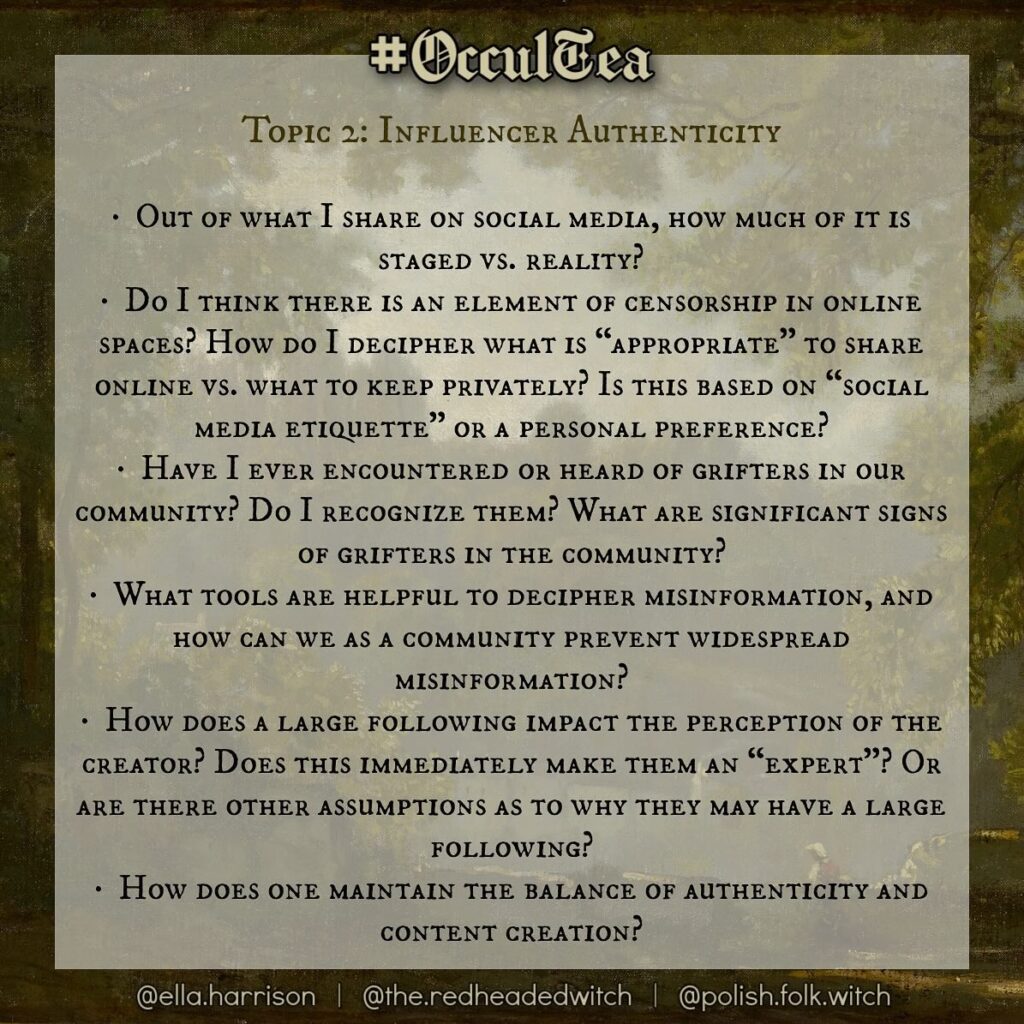
Topic 2: Influencer Authenticity
Out of what I share on social media, how much of it is staged vs. reality?
There’s a look and feel that I like–clean, minimalist, specific colours and fonts–and I use these to maintain a cohesive appearance that includes social media. I write a script for some videos to organise my thoughts, give the video structure and clarity, and make recording and editing easier. However, my practices and experiences are genuine. I don’t stage altars, rituals, or magick.
Is there an element of censorship in online spaces? How do I decipher what is "appropriate" to share online vs. what to keep privately? Is this based on "social media etiquette" or a personal preference?
There is an inherent element of self-censorship. I consider the potential impact of my posts. Some posts are responses to things I find problematic or questions I receive, but I don’t need to point to anyone; I can just share my opinion or approach.
Personal preferences also play a significant role. Certain aspects of my practice and life are sacred and private, reserved for personal reflection and offline connections. To Keep Silent is a part of my magickal philosophy. Deciphering what is “appropriate” involves assessing the potential impact on myself and the community, respecting the boundaries of privacy, and adhering to a sense of ethical responsibility in my online presence.
Have I ever encountered or heard of grifters in our community? Do I recognise them? What are significant signs of grifters in the community?
To clarify, I’m referring here to grifters online. There is a straightforward category of fraudsters. The most obvious example is the scammer that clones a social media account, a form of identity theft. Then, they reach out to friends and followers and start running scams. In our community, this often begins with offers of divination.
Here’s how to identify a cloned account.
- The user name or handle of the fake account is likely misspelled.
- The fake account may have many posts, but they were likely uploaded within a few days. Also, the original account will have many more posts.
- The fake account has fewer followers than the real account.
Links on the fake account are typically broken. - If you follow them, the fake account will IM you to offer you a tarot or other kind of reading. Our well-known Pagans and Witches do not solicit.
I’ve experienced this on Facebook, Instagram, and TikTok. I try to have the fake accounts removed, but this is so pervasive that some people don’t bother.
Some people are presenting as Witches wishing to use their platforms to capitalise on the lucrative popularity of witchcraft. Are they grifters? I don’t know, but I am wary of people who:
- have no reputation offline
- have no known training
- claim many titles but don’t say where they got them
- share little about their beliefs and practices
- don’t demonstrate a commitment to spiritual growth and well-being
- engage in superficial, performative practices
- place an excessive focus on financial gain
- rely on marketing buzzwords
- are reluctant to share knowledge freely
- tend to create exclusive, profit-driven spaces
- claim to be the only or largest anything
These are all red flags.
What tools are helpful to decipher misinformation, and how can we as a community prevent widespread misinformation?
I’m unsure of what “misinformation” means in Paganism and Witchcraft. When dealing with general fake news, disinformation, and misinformation, good advice is to question the information and source, consult reputable sources, fact-check and cross-reference. I suppose the same applies when someone says that nine million women were killed during the Burning Times or that you can’t buy your first tarot deck.
How does a large following impact the perception of the creator? Does this immediately make them an "expert," or are there other assumptions about why they may have a large following?
A large following can influence the perception of a creator within the community, but it doesn’t automatically confer expertise. A large following may result from various factors such as engaging content, relatability, or effective marketing rather than comprehensive knowledge or experience in the subject matter. Also, having published a book doesn’t make one an expert either.
Expertise within Paganism and Witchcraft is relative, however. I’ve been a practitioner for nearly 30 years, initiated into Georgian Wicca for 17, and I know a lot, but I’m not an expert in anything.
How does one maintain the balance of authenticity and content creation?
Unless you present a persona markedly different from your private character, there shouldn’t be a tension between authenticity and content creation.
My content is curated insofar that it is more polished than what you’d get if you stood before me. For example, I’ve had time to think about this blog entry, to draft and edit it, but it is true to my personality and values.
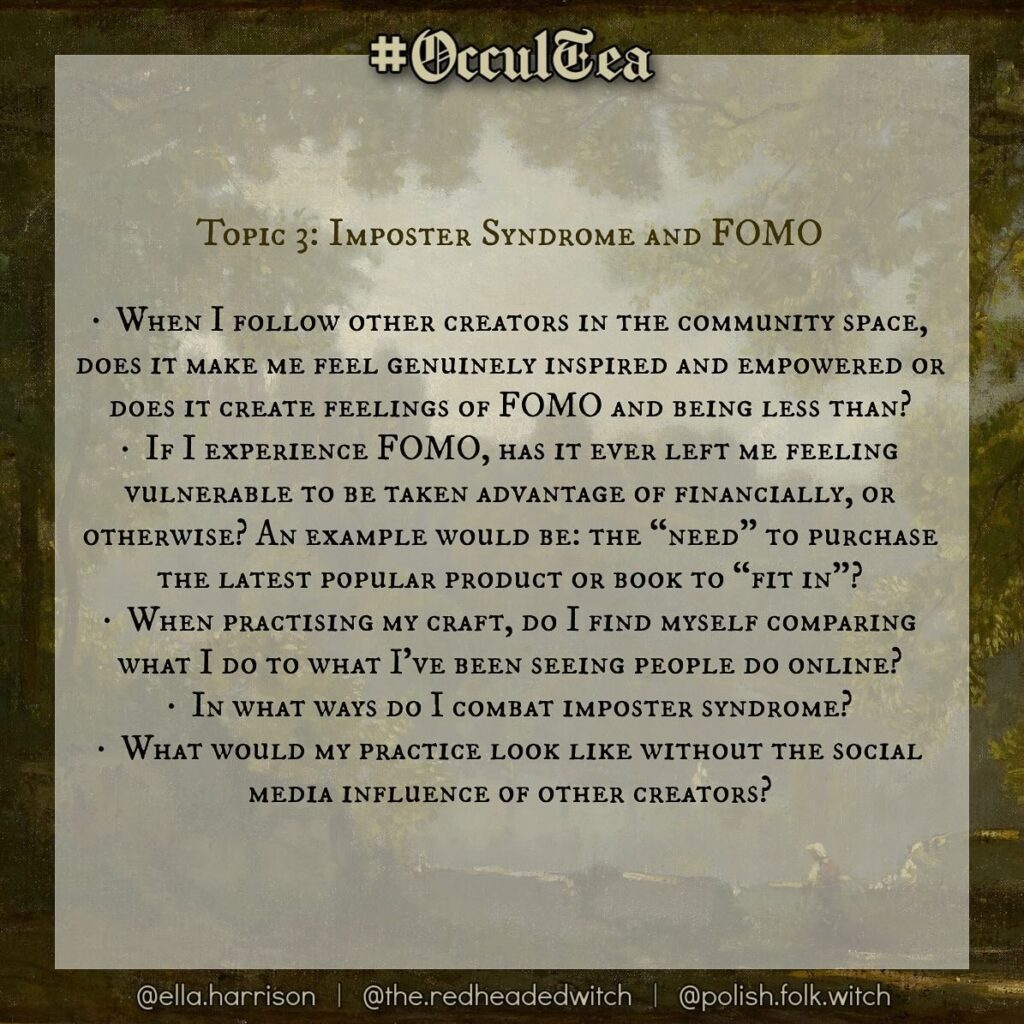
Topic 3: Imposter Syndrome and FOMO
When I follow other creators in the community space, does it make me feel genuinely inspired and empowered, or does it create feelings of FOMO and being less than?
As I mentioned previously, I follow few content creators. I follow family, friends, acquaintances, and Pagans, primarily bloggers whose work and approaches I admire. Short-form videos are fun, but I prefer long-form written content where Pagans and Witches share their experiences and perspectives and explore ideas more substantially. I know how to create a spell jar, TikTok, and content like that doesn’t inspire or empower me. I’m more interested in the qualities of good Pagan leadership and exploring why our passion transforms into something more dangerous.
If I experience FOMO, has it ever left me feeling vulnerable to being taken advantage of financially or otherwise? For example, the "need" to purchase the latest popular product or book to "fit in"?
I am guilty of making an impulsive purchase, and sometimes, I want to know what all the fuss is about. Still, I generally prioritise aligning my purchases with genuine interests and needs rather than succumbing to external pressures.
When practising my Craft, do I compare what I do to what I've been seeing people do online?
Yes, at times, but not in a way that makes me feel inadequate about my Craft. I primarily consider similarities and differences; perhaps it inspires an idea or a technique.
In what ways do I combat imposter syndrome?
I’m terrible with imposter syndrome. I’m intelligent, good at many things, and supported by my family, friends, and beautiful communities. Still, I struggle to shake imposter syndrome.
What would my practice look like without the social media influence of other creators?
The influence of social media influencers and content creators on my practice is minimal. My practice is more significantly shaped by the guidance of my teachers and the shared experiences with friends. I prioritise the insights from personal interactions, exploration, traditional sources, and direct experiences.
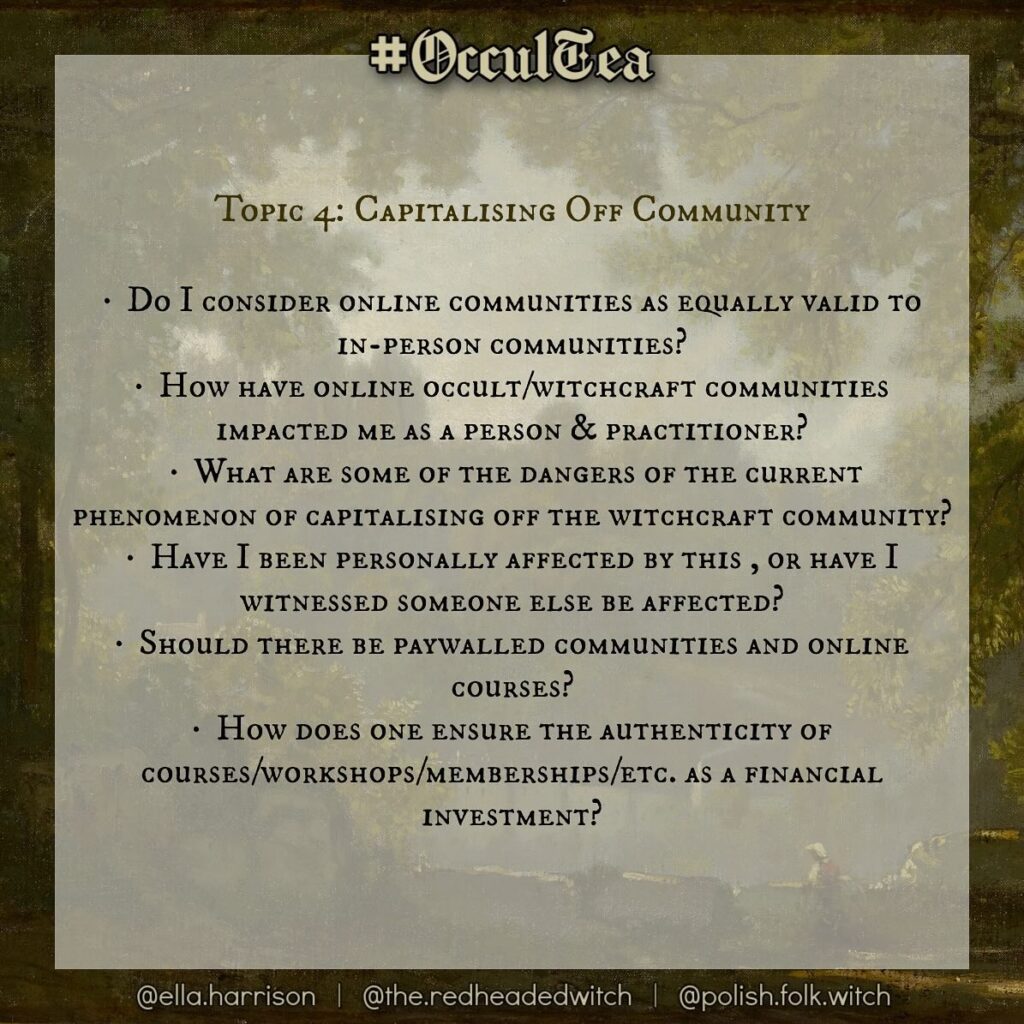
Topic 4: Capitalising on Community
Are online communities equally valid to in-person communities?
While I acknowledge the validity of both online and in-person communities, they are different. Online communities provide accessibility and a global reach, allowing for diverse connections and shared experiences beyond geographical constraints. In-person communities offer a tangible and immediate connection, fostering a sense of shared energy and presence unique to physical gatherings.
I live in Australia, but the majority of my Pagan community is in the United States. Although there are opportunities to gather in person, the Mt Shasta Goddess Temple is primarily an online community. My coven is an in-person community based in Miami, but three of us are outside Miami, and one is a part-time digital nomad. I deeply appreciate being able to join gatherings remotely. Still, it’s not the same as being physically together in a circle, holding hands, chanting, raising energy, and sharing Cakes and Ale.
The same applies to online and in-person festivals. Online festivals are convenient, accessible, and often more affordable than in-person events. In-person festivals offer rituals, music and dance, divination, and shopping, and are meeting places and reunions. My favourite memories of in-person festivals all relate to the people I was with while visiting the suites at PantheaCon, sitting around the fire late at night at Florida Pagan Gathering, and watching the fairies steal people’s shoes at Merry Meet in Amherst.
How have online occult/witchcraft communities impacted me as a person and practitioner?
The answer to this question depends on what “online communities” means. I don’t belong to online communities such as Pagan Forum, the Cauldron, or even Reddit, but I was a member of MysticWicks many years ago. It didn’t have a lot of impact, but it was fun, and I met people there that I later corresponded with privately and met in person. The most significant impact comes from the in-person communities I’m part of using the internet to stay connected.
What are some of the dangers of the current phenomenon of capitalising off the witchcraft community?
Commercialisation can lead to commodifying sacred practices and spiritual traditions, diluting their authenticity for profit. Commodification can contribute to cultural misappropriation, where practices are extracted from their cultural context and commercialised without respect for their origins. We’ve seen this for years with dreamcatchers.
Misleading marketing tactics promote products or services as having magical or spiritual benefits without genuine substance, preying on consumers’ trust. Marketing also perpetuates superficial trends and aesthetics, overshadowing depth and diversity. This can further contribute to gatekeeping and exclusivity, where certain practices are deemed more legitimate based on commercial success.
Have I been personally affected by this, or have I witnessed someone else be affected?
I have not been directly affected and don’t know anyone who has, but I recall the Carnelian and Moldavite TikTok hypes that led to shops running out of crystals. I see the general impact of the commercialisation of witchcraft. It contributes to the perception that spiritual growth is intertwined with commercial transactions, potentially leading to exploitation and feelings of inadequacy for those who cannot afford certain products or services. It also erodes the sharing of knowledge, mutual support, and inclusivity and fosters competition rather than collaboration.
Should there be paywalled communities and online courses?
Paywalled communities and courses can offer creators a means to sustain their work, compensating them for their time, expertise, and resources (and keep trolls away). This financial support enables creators to continue producing valuable content and fostering community engagement. Concerns arise when paywalls limit access to essential knowledge or create financial barriers.
Striking a balance is crucial – while creators deserve fair compensation, there should also be a provision of financially accessible resources to ensure inclusivity and equal opportunities for all practitioners.
How does one ensure the authenticity of courses/workshops/memberships, etc., as a financial investment?
I listed some red flags above regarding people selling Paganism and Witchcraft. Investigate the background of the creator or organiser. Can they verify their credentials? Do they have a good reputation? Are they transparent about their content, objectives, and outcomes? Be wary of vague promises or claims that seem too good to be true. Do they have a code of conduct and ethical policies? Evaluate the pricing structure of the course or membership. Ethical pricing reflects a balance between compensation and accessibility. Lastly, do they share resources and engage with the community beyond paid offerings? And is it really free? I don’t mean free to get your email and bombard you with daily offers or a free webinar as a stepping stone to a more expensive program. I mean free with no strings attached.
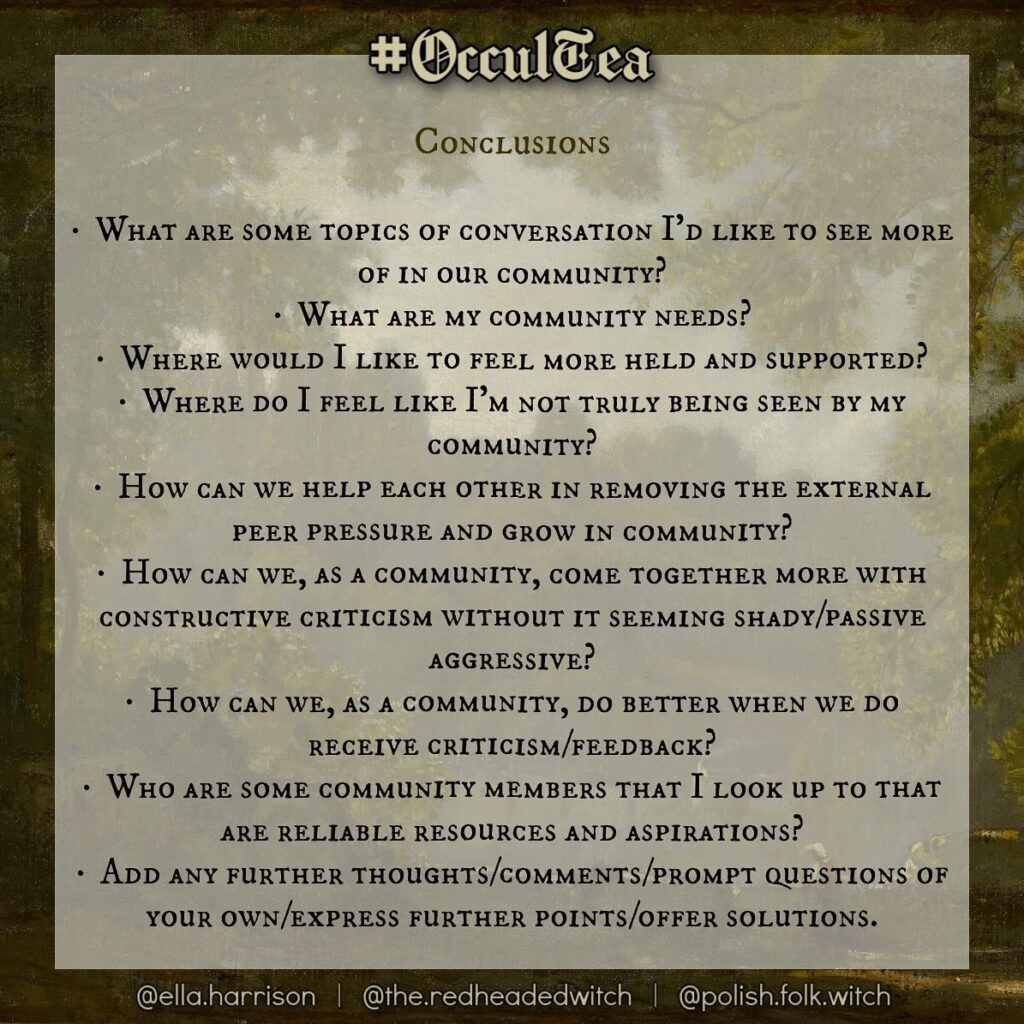
Conclusions
What conversation topics would I like to see more of in our community?
I would appreciate seeing more discussions on ethical considerations in Witchcraft, sustainable practices, and historical perspectives.
I would also like to see more about practitioners beyond authors, workshop facilitators, artisans, and content creators. Pagans and Witches provide many other services, such as healing, art, ceremony and ritual, prison and military ministry, and pastoral care. We have news like The Wild Hunt, education like Cherry Hill Seminary, and libraries like the Adocentyn Research Library.
What are my community needs?
Where would I like to feel more held and supported?
I don’t know about needs, but I have two wants. First, I want to feel safe everywhere I go, including online spaces. Second, I want people to show up when they say they will. They are big asks, I know.
Where do I feel like my community is not truly seeing me?
I joke that Cassandra is my spirit animal. Cassandra was a Trojan princess dedicated to Apollo. She had the gift of prophecy, but Apollo cursed her so that nobody would believe her prophecies. I don’t have a problem with people believing me; my problem is that people forget.
It happens at least once a week that someone sends me something via social media that I posted a week ago or longer. Something I post is often ignored, and someone else is celebrated for posting the same information or resource. Some of that has to do with what our social media feeds show us and when.
How can we help each other remove the external peer pressure and grow in the community?
Supporting each other in mitigating external peer pressure and fostering growth within the community involves cultivating a collaborative culture that emphasises authenticity and genuine self-expression, promotes diversity (including people of different ages), and encourages self-reflection as an integral part of any spiritual journey.
How can we, as a community, come together more with constructive criticism without seeming shady/passive-aggressive?
How can we, as a community, do better when we do receive criticism/feedback?
One way to deal better with criticism online is to assume positive intentions. We all have blind spots, knowledge gaps, and biases, but that doesn’t mean we’re out to hurt people.
Providing criticism is important, and so is the delivery of it. Rather than focusing on past wrongs, consider future progress. Be specific about what needs to be improved, focus on the situation, not the person, and provide actionable advice.
Avoid immediately reacting if you’re at the receiving end of the criticism. Step back and take some deep breaths. Listen to understand, not respond, and assess it. Is it valid? If so, how can you use it to improve? If not, is it worth pushing back?
One of the problems is that social media incentivises public drama, and people prefer to battle in the arena rather than address conflict privately and directly. There’s a sense that if someone says something publicly, they deserve public criticism, but that is more likely to escalate an issue rather than open honest dialogue and create change.
We can do better by improving our communication and conflict resolution skills and our ability to give and receive feedback, modelling positive behaviour, and prioritising constructive outcomes.
Who are some community members that I look up to as reliable resources and aspirations?
I don’t know about “look up to” and “aspirational”, but there are a lot of Pagans and Witches that I respect, such as Selena Fox, Mary K. Greer, Christopher Penczak, Ivo Dominguez, Jr. and my fabulous friends doing awesome things you may never hear about because their presence online is minimal.
Among Pagans and Witches who are more active online, here’s a list of people whose work I enjoy and who are doing interesting things.
- John Beckett of Under the Ancient Oaks has an approach that is practical, down-to-earth, and numinous.
- Foolish Fish on YouTube is a friendly reviewer of esoteric and occult books and shares food for thought.
- Thumper Forge of Fivefold Law is insightful and funny. I especially like their blog and TikTok.
- Thorn Mooney is a fellow Gen Xer who, like me, grew into Witchcraft during the 1990s, and her books, commentary, and manner resonate with me. I follow her primarily on YouTube.
- Laura Perry is building Modern Minoan Paganism. Her Facebook group has 1.6k members sharing historical information, resources, current developments in archaeology, and exploring gnosis together.
- Dr Angela Puca is a charming scholar on esotericism, Paganism, witchcraft, and the occult. I follow her primarily on YouTube.
- Benebell Wen writes primarily about divination, and I like her work on tarot. I also like her voice– thoughtful, optimistic, and sensible.
If you made it to the end, your scrolling finger has had a good workout, and you have my sincerest thanks. I’d love to hear your thoughts about any questions (or my answers).


Hi Cosette! I really enjoyed your thoughtful blog post on these topics, and I resonate a lot with what you’ve said here. I too believe very much in the To Keep Silent philosophy, because to me it preserves the intentions and energy of magickal practices. This blog post has provided much to reflect on deeper. I also love the way you’ve sectioned and organized the questions here. Thank you for sharing your thoughts 🙂
Thank you so much for reading and your kind comments!